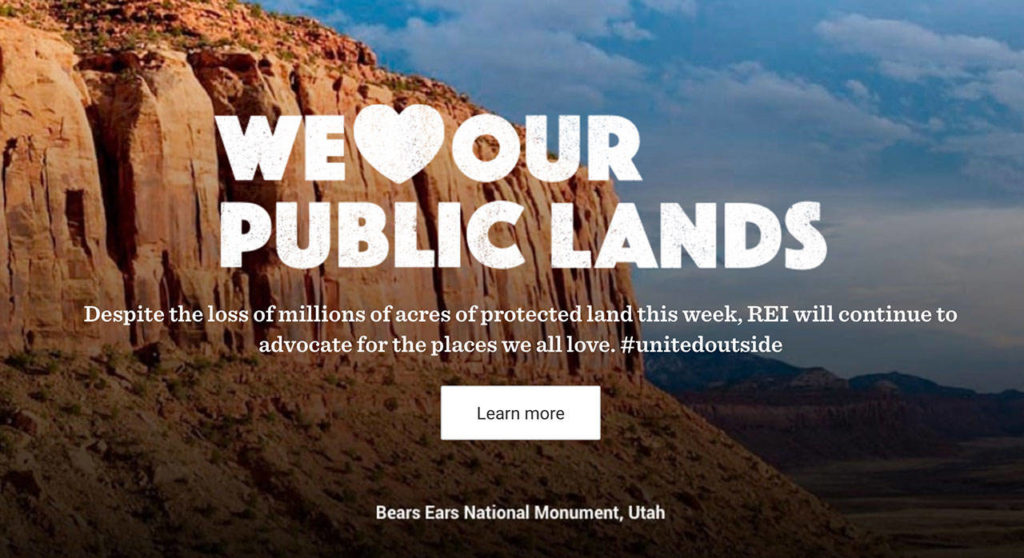By Travis M. Andrews / The Washington Post
Anyone who visited Patagonia’s website on Monday night in search of a warm winter fleece or a pair of snow pants was in for a surprise. Replacing the usual shopping choices were giant white letters on a black background offering a stark message: “The President Stole Your Land.”
The message continued in smaller letters: “In an illegal move, the president just reduced the size of Bears Ears and Grand Staircase-Escalante National Monuments. This is the largest elimination of protected land in American history.”
The page was referring to President Donald Trump’s order Monday reducing the size of two national monuments in Utah by nearly two million acres combined.
Patagonia’s move was part of an ongoing war in the West, one the company and the outdoor recreation industry generally has been waging against exploitation of the lands for fossil fuel, development and cattle grazing.
REI, the Kent-based recreational gear company, devoted part of its homepage to a more modest protest. “Despite the loss of millions of acres of protected lands this week,” the company said, “REI will continue to advocate for the places we all love.”
The companies, as well as the entire outdoor recreation industry, are allied with Indian tribes, for whom some of the lands are sacred, as well as with conservationists.
Their lawsuits began flying as soon as the decision was announced.
One came from a coalition of five tribes, including Hopi, Navajo Nation, Pueblo of Zuni, Ute Mountain Ute Tribe and Ute Indian.
Separately, a coalition of 10 conservation groups, including the Natural Resources Defense Council, the Sierra Club and the Grand Canyon Trust, filed a lawsuit against Trump, Interior Secretary Ryan Zinke and Bureau of Land Management director Brian Steed through the nonprofit environmental law organization Earthjustice. The suit, which is likely to provoke a prolonged court battle, claims Trump cannot legally revoke the land’s monument status.
Both actions were in response to Trump’s decision to reduce the Grand Staircase-Escalante National Monument by more than 800,000 acres, or 46 percent, and the Bear Ears National Monument by more than 1.1 million acres, or 85 percent, making it “the largest reduction of public-lands protection in U.S. history,” as The Post’s Josh Dawsey and Juliet Eilperin reported.
The move was supported by Republicans in Utah, particularly Sen. Orrin G. Hatch and Gov. Gary R. Herbert. They argue that the areas protected were unnecessarily vast, limiting the potential for economic growth and generally increasing federal control over a state where some two-thirds of the land is already owned by the U.S. government.
Trump said he reduced the monuments because “because some people think that the natural resources of Utah should be controlled by a small handful of very distant bureaucrats located in Washington. And guess what? They’re wrong.”
Peter Metcalf, founder of Black Diamond Equipment and an environmental activist, called the move “a rape and pillage approach.”
In an interview with The Washington Post, he called it a “real tragedy, to tear up this place that is rich with dinosaur bones, cultural antiquities and is a sportsman’s paradise. That’s not the best use of the land.”
Patagonia’s message included illustrations showing what part of the two monuments will no longer be protected and facts about protected lands, noting that “90 percent of U.S. public lands are open to oil and gas leasing and development; only 10 percent are protected for recreation, conservation and wildlife.”
The website urged people to take to social media, using the hashtag #MonumentalMistakes to protest the order. Many Instagram users posted photographs of the two landscapes, while many Twitter users praised the clothing company.
“You stole our lands. They belong to ALL Americans. Not corporations,” tweeted one user, who employed the hashtag.
“The largest land heist in our history,” tweeted another.
Patagonia founder Yvon Chouinard told CNN he too plans to sue the president.
“I’m going to sue him,” Chouinard said. “It seems the only thing this administration understands is lawsuits. I think it’s a shame that only 4% of American lands are national parks. Costa Rica’s got 10%. Chile will now have way more parks than we have. We need more, not less. This government is evil and I’m not going to sit back and let evil win.”
Patagonia has long been an active participant in the fight to protect the environment. In 1986, the company pledged to give 10 percent of its profits to small groups focused on either saving or restoring natural habitats, its website stated.
Some critics consider Chouinard — and by extension his company — hypocritical, pointing out his vast wealth. He ranked number 11 on the Forbes list, “12 Notable New Billionaires Of 2017.”
“What’s his net worth?” San Juan County Commissioner Phil Lyman asked about Chouinard in a CNN interview. “You got Patagonia here waving the flag of environmentalism while he’s just completely exploiting the outdoors for industrialized tourism.”
Talk to us
> Give us your news tips.
> Send us a letter to the editor.
> More Herald contact information.


























